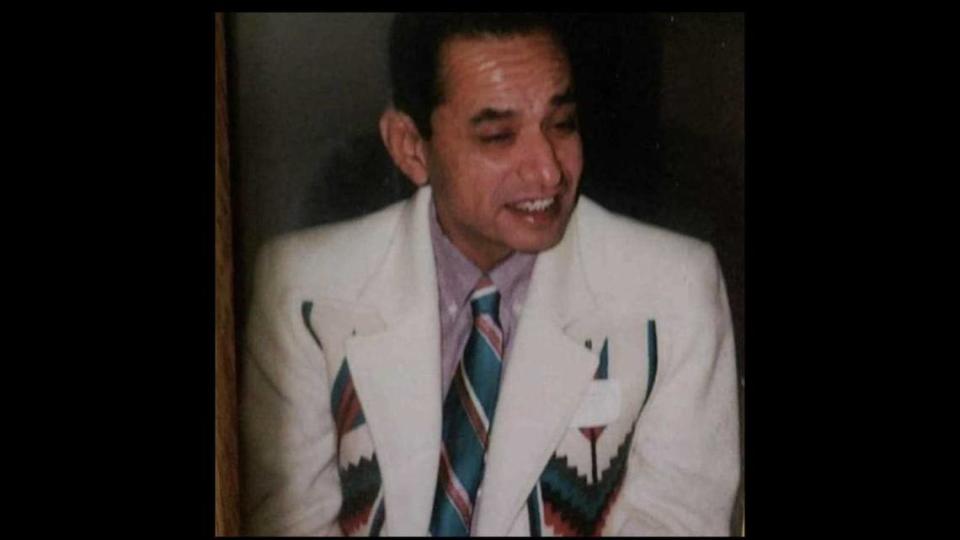California AG reviews 22-year-old murder case of Sacramento-area Native American man
- Oops!Something went wrong.Please try again later.
California Department of Justice prosecutors will review the Sacramento County District Attorney’s Office’s decision to decline filing murder charges against the suspected killer of a Native American man bludgeoned to death more than 22 years ago.
Before dying in October 2001, 50-year-old Allan Olvera was heavily involved in the advocacy of indigenous people’s affairs. The member of the Miwok tribe served as vice chairman of the Sacramento Native American Caucus and helped found California’s first accredited tribal college in Yolo County called D-Q University.
For Olvera’s family, the situation highlights difficulties indigenous people face when seeking justice for their missing and murdered loved ones. Native Americans face disproportionately high rates of violence and lack resources to address and solve cases.
Making an arrest in Olvera’s death could build hope for other American Indians who languish in sadness at the lack of justice, said Matt Franklin, Olvera’s nephew.
“This could be seen as a national win for Sacramento,” Franklin added.
In a statement, Sacramento County Chief Deputy District Attorney Scott Triplett said two prosecutors in the homicide unit reviewed the case against Olvera’s suspected killer on two separate occasions — one in 2016 and another in 2021. Each concluded independently there was insufficient evidence to prove the case beyond a reasonable doubt, Triplett wrote.
“The Sacramento District Attorney’s Office vigilantly seeks justice for homicide victims, and we empathize with every family that experiences such a loss,” Triplett said in an email. “However, we must balance every filing decision with our ethical obligation to seek prosecution only when the evidence establishes guilt beyond a reasonable doubt.”

The case
Signs warning something was amiss struck when Olvera didn’t show up for the California Indian Conference at Sacramento State for the first time.
Franklin’s grandparents — Olvera’s parents — went to their son’s Elk Grove home and found his battered body on Oct. 11, 2021.
“Words cannot explain what my grandparents had to go through,” Franklin said.
He added Olvera’s father’s health declined and his hair went completely white. Olvera served as a father figure for him, Franklin said, after he lost his biological father.
Autopsy reports said Olvera was beaten to death with an unknown object at his home in the 8400 block of Turbo Court and found sitting in a chair. There was no sign of forced entry, but the place was ransacked apparently in a search for items such as electronics and American Indian jewelry, according to The Sacramento Bee’s archives.
Olvera, who never married, had a wide impact on the American Indian community.
He taught students about their culture and would ensure elders in their community would get salmon around the Thanksgiving holiday, Franklin said.
“Until they passed, I saw they were in pain daily,” Franklin said of Olvera’s parents. “Our family was very close.”
Prosecutors’ decisions
The California Attorney General’s Office wrote in a Oct. 31 letter to Olvera’s family that attorneys will apply a “deferential standard of review” while examining the evidence. It’s a process in which attorneys will see if any “reasonable prosecutor” could arrive at the same decision as that of the Sacramento County DA’s Office, the letter said.
The volume of the materials is significant and the review will take time, the letter said, while noting the reassessment happened because Olvera’s family requested it.
“We will inform you of our findings as soon as we complete our review,” the letter said.
Triplett wrote his office recognizes the state Attorney General’s Office has the authority to review all criminal cases. He also welcomed further evaluation by the DA’s Office if new evidence were to arise.
Franklin also said there was DNA and fingerprint evidence in the case that points to an alleged killer. Sacramento County Sheriff’s spokesman Sgt. Amar Gandhi declined to comment about the case’s details and said simply deputies’ investigation is ongoing.
Triplett wrote that his office carefully considered all evidence.
“Although the presence of DNA and fingerprints can be powerful evidence in any prosecution, it is not dispositive to the issues here, and should not be viewed in isolation,” he continued. “All of the evidence must be compared and considered.”
For the Olvera’s family, an arrest in this case would put to rest any fears they have for their own safety, Franklin said. His mother — Olvera’s sister — is scared someone could hurt them after not getting caught for more than two decades.
The family made a promise to the grandparents that this case would be solved. However, they’ve now died and it’s still unsolved — just hitting home the point that missing and murdered cases for indigenous often languish, Franklin said.
“We didn’t lose hope that it wouldn’t be solved,” Franklin said. “We kinda lost hope in the system.”

